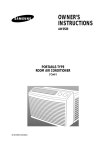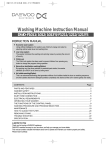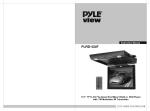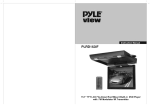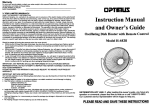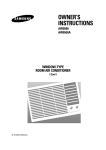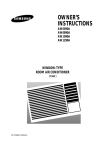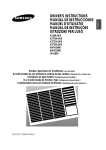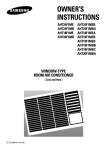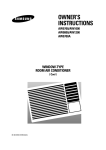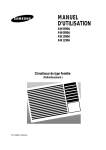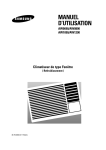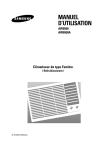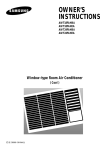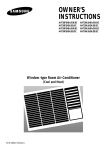Download Samsung AW0819 User Manual
Transcript
OWNER’S INSTRUCTIONS AW0719 AW0819 WINDOW-TYPE ROOM AIR CONDITIONER ( Cool ) E S DB68-00322A (1) Safety Precautions The following safety precautions must be taken when installing and using your air conditioner. 1 The air conditioner must be plugged into its own specific power source, which must be installed in compliance with national wiring, earthing and safety regulations. Depending on national regulations and your specific installation, you may need to install: ◆ A circuit breaker For further information on electrical requirements, contact a professional electrician. This device must be installed according to the national electrical rules. 2 Make sure that the unit is correctly ventilated at all times; do NOT place clothing or other materials over it. 3 NEVER spill liquid of any kind into the unit. Should this happen, unplug the unit and contact your installation specialist. 4 Do NOT insert anything between the air outlet blades, as the inner fan may be damaged and you may be hurt. Keep children away from the unit. 5 ALWAYS ensure that the power cable is in good condition. Make sure that it is not walked on or damaged by items placed on or against it. If the power cord is damaged in any way, it must be replaced by an approved power cord available from the manufacturer or its service agent. 6 Do NOT attempt to repair the unit yourself. If it is damaged in any way, contact: ◆ An approved service center ◆ The outlet at which the air conditioner was purchased 7 Do NOT place any obstacles in front of the unit. E-2 Contents ◆ PREPARING YOUR AIR CONDITIONER ■ ■ ■ Safety Precautions ......................................................................................... Air Conditioning Unit - Main Parts and Control Panel .................................... Getting Started ............................................................................................... 2 4 5 ◆ OPERATING YOUR AIR CONDITIONER ■ ■ ■ ■ ■ Cooling Your Room ........................................................................................ Airing Your Room ........................................................................................... Switching the Air Conditioner Off .................................................................... Adjusting the Air Flow Direction Horizontally .................................................. Adjusting the Air Flow Direction Vertically ...................................................... 6 7 7 8 8 ◆ RECOMMENDATIONS FOR USE ■ ■ ■ ■ ■ Operating Recommendation ........................................................................... 9 Temperature and Humidity Ranges ................................................................ 9 Cleaning Your Air Conditioner ........................................................................ 10 Solving Common Problems ............................................................................ 11 Technical Specifications ................................................................................. 11 ◆ INSTALLATION ....................................................................................................... 12 E-3 Air Conditioning Unit - Main Parts and Control Panel HOW TO OPEN THE OPERATING UNIT. ◆ Press the area marked “ ”on the door. ❄ The design and shape are subject to change according to the model. Inner air flow blades (right/left orientation) Air outlet Outer air flow blades (up/down orientation) Air inlet (Outside) Air inlet (Inside) Ventilation lever Air filter (The air filter is located in inside.) Power plug (The type of the power plug may differ according to the type of local power supply.) OPERATION THERMOSTAT OFF LOW FAN 6 LOW COOL 4 2 Operating mode selection dial HI FAN 8 10 HI COOL 12 COOLEST E-4 Temperature control dial Getting Started You have just purchased a window-type room air conditioner and it has been installed by your installation specialist. Your Owner’s Instructions contain much valuable information on using your air conditioner. Please take the time to read them as they will help you take full advantage of the unit’s features. The booklet is organized as follows. ◆ The illustration on page 4 shows the air conditioning unit; it indicates the location and purpose of the main parts and controls on the unit. ◆ In the main part of the document, you will find a series of step-by-step procedures for each function available. The illustrations in the step-by-step procedures use four different symbols: PRESS PUSH ☛ ➢ IMPORTANT NOTE E-5 Cooling Your Room You must select the Cool mode if you wish to lower the temperature in your room. You can also set the fan speed. 1 OPERATION Select the operating mode and fan speed. To cool your room with a... Set the operating mode selection dial to... High fan speed HI COOL Low fan speed LOW COOL OFF LOW FAN LOW COOL Result: HI FAN ➢ 2 THERMOSTAT 81˚F ~ 73˚F You can change modes at any time. To adjust the temperature, turn the temperature control dial to the desirde position. Possible temperatures: Between 64°F and 84°F inclusive. 6 4 ◆ The air conditioner starts up in Cool mode. ◆ The fan starts up at the speed selected. HI COOL Result: 8 81˚F ~ 84˚F 2 10 The air conditioner starts cooling if the room temperature is higher than the selected temperature. 73˚F ~ 64˚F 12 COOLEST 3 E-6 To control the direction of the air flow, refer to page 8. Airing Your Room If the atmosphere in your room is stale, you can air it using the Fan feature and if necessary, evacuate the stale air outside. 1 If you wish to evacuate stale air outside, push the ventilation lever on the front of the unit to the right and the open position ( ). Result: The air inside the room circulates and stale air is evacuated outside. Otherwise, push the ventilation lever to the left and the closed position ( Result: 2 ). The air simply circulates inside the room. Set the operating mode selection dial to the HI FAN or LOW FAN position. ➢ OPERATION HI FAN : The fan turns rapidly. LOW FAN : The fan turns slowly. Result: 3 The air conditioner starts up in Fan mode. To control the direction of the air flow, refer to page 8. OFF LOW FAN LOW COOL HI COOL HI FAN Switching the Air Conditioner Off You can switch the air conditioner off whenever you want. 1 To switch the unit off, simply set the operating mode selection dial to the OFF position. Result: OPERATION OFF The air conditioner stops operating. LOW FAN HI FAN LOW COOL HI COOL E-7 Adjusting the Air Flow Direction Horizontally Depending on the position of the unit in your room, you can adjust the orientation of the inner air flow blades on the right-hand side of the unit, thus increasing the efficiency of the air conditioner. Hold the inner air flow blades, and adjust them to the desired direction. Adjusting the Air Flow Direction Vertically Again depending on the position of the unit in your room, you can adjust the orientation of the outer air flow blades on the right-hand side of the unit. RECOMMENDATION When... Adjust the blades to face... Cooling Upwards. Adjust the air flow blades to the desired position, by pushing them upwards or downwards. ➢ E-8 If you orient the air flow blades downwards and the unit operates in Cool mode for long periods of time, dew may: ◆ Form on the surface of the blades ◆ Drip from the blades Operating Recommendation Here is a recommendation that you should follow when using your air conditioner. Topic Recommendation Power failure If a power failure occurs when the air conditioner is operating, the unit is switched off. When the power returns, the air conditioner starts up again automatically. Temperature and Humidity Ranges The following table indicates the temperature and humidity ranges within which the air conditioner can be used. Mode Outdoor Temperature Indoor Temperature Indoor Humidity Cooling 69.8°F to 109.4°F approx. 69.8°F to 89.6°F approx. 80% or less If the air conditioner is used at... Higher temperature Then... The automatic protection feature may be triggered and the air conditioner stopped. Lower temperature A water leakage or some other malfunction may happen if the heat exchanger freezes. Higher humidity levels Water may condense on and drip from the surface of the unit if it is used for long periods. E-9 Cleaning Your Air Conditioner To get the best possible use out of your air conditioner, you must clean it regularly to remove the dust on the air filter. ☛ 1 Hold the handle of the air filter, pull it slightly forward, and then pull it out to the right side. 2 Remove all dust on the air filter with a vacuum cleaner or brush. 3 When you have finished, insert the air filter into the original position. 4 Clean the outer surfaces with a damp cloth and mild detergent (do NOT use benzene, solvents or other chemicals). Wipe them dry with a clean, soft cloth. ➢ E-10 Before cleaning your air conditioner, ensure that it is switched off and unplugged from the wall socket. If you... Then... Will not be using the air conditioner for a long period of time ◆ Set the fan going for a few hours to dry the inside of the air conditioner thoroughly. ◆ Switch the air conditioner off and unplug it from the wall socket. ◆ Clean the filter and outer surfaces. Have not used the air conditioner for a long period of time Set the fan going for a few hours to dry the inside of the air conditioner thoroughly. Solving Common Problems Before contacting the after-sales service, perform the following simple checks. They may save you the time and expense of an unnecessary call. PROBLEM EXPLANATION / SOLUTION The air conditioner does not operate at all ◆ Check that the circuit breaker used for the air conditioner has not been triggered. ◆ Check that the power cable is plugged into a wall socket and the socket is switched on, if necessary. ◆ Check that the correct operating mode has been selected (cooling or airing). The air conditioner does not cool ◆ Check that the correct operating mode has been selected. ◆ The room temperature may be too low. ◆ Dust may be blocking the air filter; refer to page 10 for cleaning instructions. ◆ Check that there is no obstacle blocking the air flow into or out of the unit. Odours are permeated in the room during air conditioning ◆ Air the room. Technical Specifications Design and specifications are subject to change without notice. Model AW0719 AW0819 Power Supply 115V~, 60Hz E-11 Installation Before installation, be sure to check the installation area for the air conditioner, and installation method of the drain hose. Checkpoints prior to installation 1 Check the cabinet and front grille of the unit for any harmful defects such as scratches. 2 Be sure to check the power supply. - Refer to the specifications on the label attached to the unit. Installation Conditions 1 Electrical Requirements For personal safety: ◆ This appliance must be properly grounded. See installation instructions. ◆ Do not, under any circumstances, cut or remove the third grounding prong from the power cord. ◆ We recommend that you do not use an extension cord or an adapter plug with this appliance. ◆ Do not change the plug on the power cord of this appliance. ◆ Follow national electrical codes or local codes and ordinances. 115V 15 AMP circuit "parallel" type 230V/208V 20 AMP circuit "perpendicular" type 230V/208V 15 AMP circuit "tandem" type 230V/208V 30 AMP circuit "tandem" type ◆ If the electric supply provided does not meet the above specifications, call a licensed electrician. ◆ Aluminum house wiring may pose special problems - consult a qualified electrician. ◆ This unit requires a separate circuit serving only this appliance. 2 Window Requirements ◆ Standard double - hung window with actual opening width of 251/2" to 37". The installation will need to be modified for windows other than the standard double-hung type. ◆ Clear vertical opening of 143/4" minimum from bottom of sash to sill. 251/2" to 37" ◆ Install the air conditioner in a window where there will be enough 143/4" min. clearance around the cabinet to allow ample circulation of air through the unit. ➢ E-12 All supporting parts should be secured to firm wood, masonry or metal. Installation of the Drain Tube Fix the drain tube as shown in the figure. Rear Rubber cap Gasket Drain Tube Screws(2EA) Installation of the Drain Pan The procedure for installing the drain pan should be determined by the condition of the installing area. ◆ In the case of an area where the drain pan can not be directly installed on the rear side of the unit after installing the air conditioner. Example: High storage 1 Hold the handle of the air filter, pull it slightly forward, and then pull it out to the right side. 2 Remove the screw. 3 Disassemble the front grille. Screw 3-1 Hold the lower part of the front grille, and then move it slightly to the left side. 3-2 Pull the lower part of the front grille slightly forward.(below three inches) 3-3 Lift the front grille upward. ☛ Applying excessive force to disassemble the front grille may cause damage to the tab ; be sure not to use excessive force. 4 Remove two screws on the lower, right and left sides of the unit. 5 Remove the chassis from the cabinet. 6 Remove the rubber cap inserted into the basepan. 7 Fix the drain pan as shown in the figure, and then connect the drain hose. (You can use any commercially-available drain hose.) Front grille Drain Pan Rear 8 Install the cabinet at the specified area after installing the drain pan, and then re-assemble it in the original condition. ◆ In the case of an area where the drain pan can be directly installed Rubber cap Drain Hose Screw on the rear side of the unit after installing the air conditioner. 1 Follow steps 6 and 7 only Bottom-Side View with Drain Pan and Hose in Place E-13 Installation Window installation Tools needed ◆ Philips head screw driver ◆ Adjustable wrench ◆ Scissors ;;;; ;; ;;;; ◆ Ruler or tape measure ◆ Pencil ◆ Leveler Parts furnished Type A Type B Type C Type D Qty-7 Qty-17 Qty-2 Qty-2 Adhesive seal strip Window gasket Screw Top channel 1 Hold the handle of the air filter, pull it slightly forward, and then pull it out to the right side. 2 Remove the screw. Front grille 3 Disassemble the front grille. 3-1 Hold the lower part of the front grille, and then move it slightly to the left side. 3-2 Pull the lower part of the front grille slightly forward. (below three inches) 3-3 Lift the front grille upward. ☛ Applying excessive force to disassemble the front grille may cause damage to the tab ; be sure not to use excessive force. 4 Remove two screws on the lower, right and left sides of the unit. 5 Remove the chassis from the cabinet. E-14 6 Attach the window filler panels to the cabinet. Top Channel 6-1 Install the top "L" shaped cannel with three Type B screws provided. 6-2 Slide the window filler panels and their frames into the channels on the top and bottom of the cabinet and assemble them to the cabinet using six Type B screws. 7 Attach the support brackets to the cabinet. 7-1 Select the Type D support bracket position that will place the bracket near the outermost point on the window sill. In most cabinets this will be the first set of holes. Using eight Type B screws, attach the support brackets to each side of the cabinet bottom. 7-2 Thread the Type C bolts into the support brackets, making sure the cabinet maintains a slightly downward slant to the outside. A 1/4" slant, from the cabinet front to the rear, is necessary. Use the level to determine the slant. 8 Attach the seal strip to the window. 8-1 Cut the adhesive-backed foam seal strip to the window width. 8-2 Remove the backing from the seal strip and attach the strip to the underside of the bottom window. 9 Type B Screws Type C Bolts ;;;;; Install the cabinet in the window. 9-1 Place the cabinet into the window with the frame on the top of the cabinet positioned just in front of the bottom window. Pull the window down until it rests on the cabinet just behind the top channel of the frame on the top of the cabinet. Top Channel 9-2 Locate three screw holes along the cabinet bottom front edge. Center the cabinet, side to side, in the window and mount it to the window stool using three Type A screws. E-15 Installation 10 Extend the window filler panels. Screw 10-1 When the window is pulled down, the window should rest on the cabinet just behind the window filler panel frames. 10-2 Slide the filler panels outward until they touch the sides of the window. Secure the panels by putting four Type A screws through the mounting holes in the panels and driving them into the window stool and sash. Screw 11 Slide the air conditioner into the cabinet. 11-1 Carefully slide the air conditioner back into the cabinet. 11-2 Reinstall the air conditioner-to-cabinet retaining screws removed in page 14. ;;;;;;; 12 Install the window gasket. Cut the window gasket to the window width and stuff it between the window and the glass to prevent air and insects from getting into the room. 13 Reinstall the grille. Refer to page 14. 14 Check for air leaks. Some installations may require additional sealing around the window and air conditioner. Check for air leaks and seal. E-16 YOUR SAMSUNG ROOM AIR CONDITIONER WARRANTY Limited Warranty to Original Purchaser Samsung will repair or replace, at our option, this product if found defective within the warranty period beginning from the original date of purchase. This Samsung Product is warranted by SAMSUNG ELECTRONICS America Inc. against manufacturing defects in materials or workmanship for the period specified. Labor Parts 1 Year (In home) 1 Year Limited 5-Years Compressor Warranty Within one year of purchase Samsung Electronics America Inc. will provide a replacement compressor if it is found to be defective in material or workmanship. During the existing four years (second through fifth year) Samsung Electronics America Inc. will provide a replacement only, without charge, if it is found to be defective in material or workmanship. Labor to install the compressor during these existing four years is not included in the warranty. All warranty repairs must be performed by a Samsung Authorized Service Station. Obligation of the Original Owner The original dated purchase receipt must be retained as proof of purchase and presented to the Authorized Serivec Station before warranty services are rendered. Exclusions of the Warranty This warranty does not cover damage due to accident, fire, flood and/or other Acts of God: misuse, incorrect line voltage, improper installation, improper or unauthorized repairs, commercial use, or damages which occur in shipping. Exterior and interior finish and plastic parts, are not covered under this warranty, Customer adjustments which are explained in the instruction manual are not covered under the terms of this warranty. This warranty will automatically be voided for any unit found with a missing or altered serial number. This warranty is valid only on products purchased and used in America. E-17 ELECTRONICS SAMSUNG ELECTRONICS AMERICA INC. 105 Challenger Road Ridgefield Park, NJ 07660. Printed in Korea


















